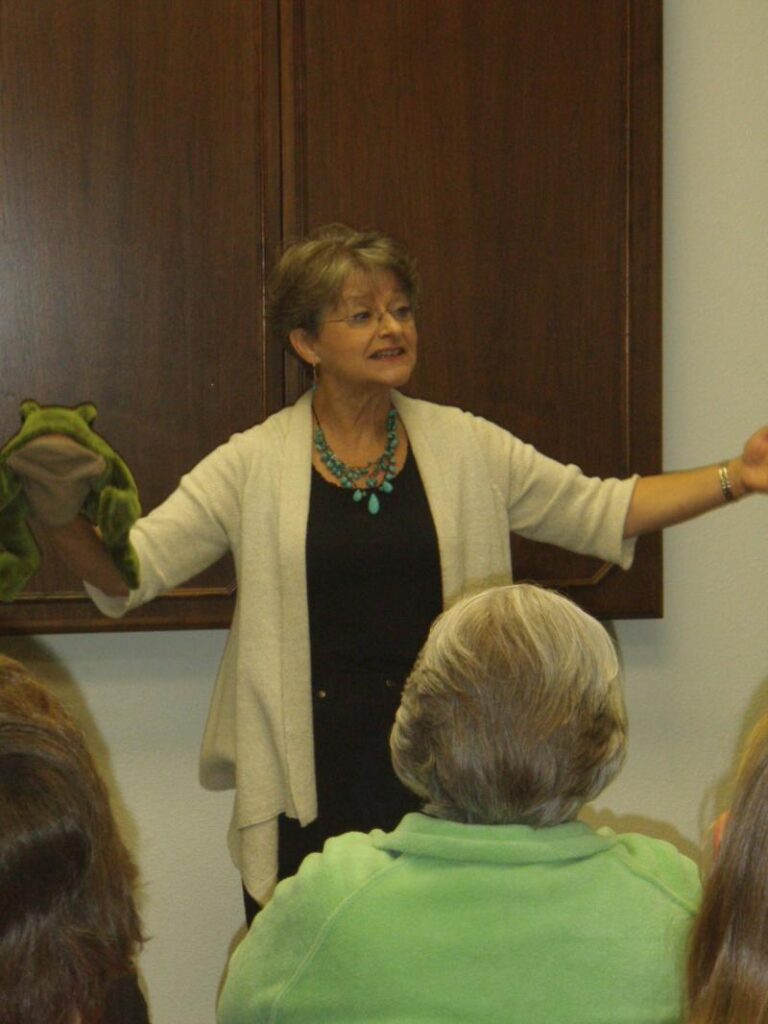
Workshops available for Children
These topics are best accomplished through school residencies:
- Beginning Storytelling
- Using Story to Become a Better Writer
Contact Terry to Schedule a Workshop
Workshop Handouts for Schools
Storytelling Is Good for Kids
Storytelling:
- Strenthens listening and comprehension skills
- Provides an opportunity for students to develop an appreciation of the range and rhythm of language
- Nurtures the imagination
- Develops higher thinking skills
- Improves language skills (retelling, sequencing, story elements)
- Develops reading skills by enriching vocabulary, increasing the awareness of story structure, promoting understanding of cause and effect, increasing critical thinking
- Enhances writing skills
- Exposes chldren to different cultures
- Demonstrates problem solving techniques
- Arouses curiosity
- Teaches values
- Can be used in all areas of the curriculum
- Builds audience skills
- Helps students connect the past with the present and future.
- Creates community
- Is a means for passing on the values and morals of cultures
How to Learn a Story
- Find a story you really like.
- Read the stroy out loud once a day for one to two weeks. This sounds like a long time, but the story will probably only take five to ten minutes to read. If you already know the story well (you’ve been reading it to your class for years,) you can probably skip this part.
- Draw out the story using simple stick figures. Concentrate on the story elements, not your art work. Or make a very simple outline.
- Do not memorize the story. Let it flow from you and put your own personality into it. You may want to memorize the very beginning or end of the story or any specific wording that is repeated or important but otherwise just picture the events.
- Practice the story in the car while driving to work or shopping. Practice it as you wash dishes or vacuum.
- Practice telling the story to a friend, your significant other, your child. Ask for feedback. If the feedback feels right, use it; if it doesn’t work for you, ignore it.
- Tell the story. Don’t be afraid of mistakes. Most things that you forget can be added at another time (Did I thell you that…?). You can even tell the audience that you forgot something. You’d be surprised how empathetic and helpful they will be.
- Be yourself. Have fun. Enjoy your audience.
A Story to Tell
In a far away land there lived a chief. he was a good chief and his people were very happy. They had everything they needed; good food, homes, clothing. But one day the people noticed that the chief was grumpy. For days he went around scowling, frowning, and muttering to himself. If anyone spoke to him, he would practically bite their head off.
Finally the people decided to see what was wrong. They went to the chief and asked if there was a problem.
“It’s these frogs! I’ve heard them all my life but now I can’t sleep with their constant croaking. I haven’t had a good night’s sleep in weeks.”
Well the people wanted their chief to be happy again so they said, “We’ll take care of the frogs. We’ll kill them for you.”
But as they turned to begin looking for the frogs, an old woman stopped them. “Do not kill the frogs. All of nature is connected. We need the frogs.”
“Go away with your foolishness!” the people hollered and pushed her out of their way.
That night the people killed all the frogs and the chief had a wonderful night’s sleep. The next night he slept like a baby. But on the third night, the mosquitoes came and no one in the village ever had a good night’s sleep again.
